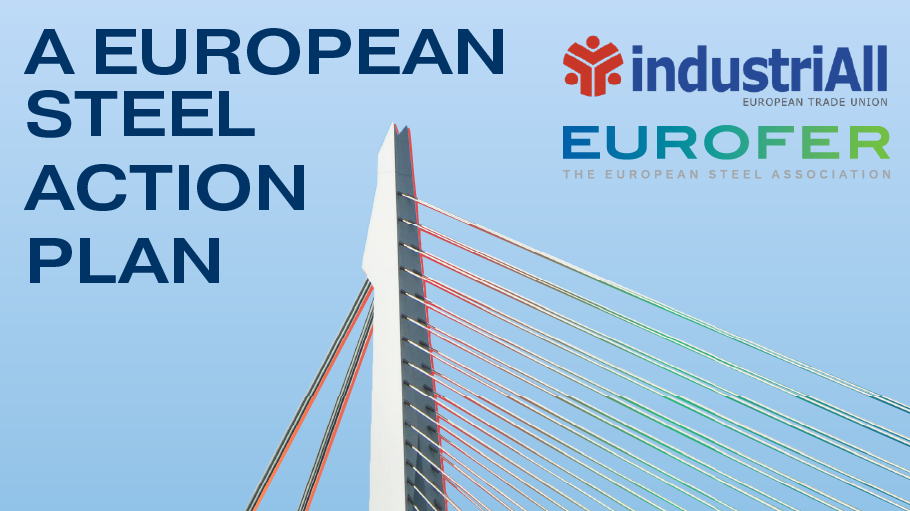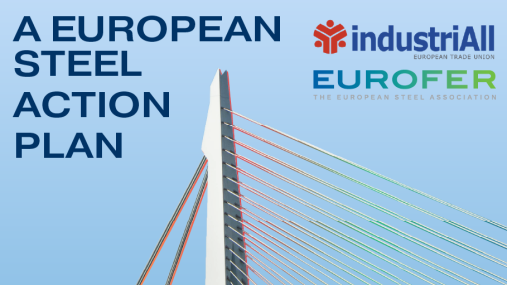
Press releases » EU Steel Action Plan now! Steel industry and steel workers unite to demand urgent action to restore the sector’s competitiveness and save thousands of jobs before it is too late.
EU Steel Action Plan now! Steel industry and steel workers unite to demand urgent action to restore the sector’s competitiveness and save thousands of jobs before it is too late.
Downloads and links
Recent updates

Brussels, 12 November 2024 - Ahead of Commissioner-Designate Séjourné’s hearing in the European Parliament, European steel social partners, supported by cross-party MEPs, jointly call for an EU Steel Action Plan to restore steel’s competitiveness, and save its green transition as well as steelworkers’ jobs across Europe.
With political transitions both in Europe and the US, the European steel social partners increase their calls for EU action to ensure that the European steel sector can compete on a tough global market while transitioning to green steel production and keeping thousands of quality jobs in Europe.
With global overcapacity at a record high and energy and raw material prices at uncompetitive levels, the European steel sector is in crisis and over 300,000 direct jobs and 2.3 million indirect jobs are at risk. This is why European steel social partners are calling for urgent EU action to safeguard the sector, its decarbonisation investments and thousands of jobs.
IndustriAll Europe and the European Steel Association (EUROFER) have produced a joint set of demands for the European Commission and EU Member States which has received cross-party support.
Today, MEPs will quiz the Commissioner-Designate Stéphane Séjourné, who has been tasked in his Mission Letter from Commission President von der Leyen to come forward with an EU Steel and Basic Metals Action Plan. The European social partners insist that this plan has teeth and is published within the first 100 days of the new Commission. There is no time to lose.
Judith Kirton-Darling, industriAll Europe's General Secretary, said:
“’The European steel sector is in crisis and every day we are dealing with production cuts, mothballing, closures and bankruptcies of steel sites across Europe. Steel jobs are highly skilled and decent jobs, and we must protect them. We completely oppose European steel sites closing only for cheap and dirty steel to be dumped on the open EU market with no respect to the environment or social standards. Decarbonisation must not lead to deindustralisation and we need the EU to ensure a level playing field and a sustainable future for European steel workers. Steel needs Europe and Europe needs steel.’’
Axel Eggert, Director General of the European Steel Association (EUROFER) added:
“Steel is the backbone of manufacturing and vital for cleantech value chains, from renewables to electric vehicles. What is at stake is more than just the steel industry, it’s Europe’s prosperity and resilience. Billions of our investments in decarbonisation are at risk, while we have to bear energy costs that are 2-3 times higher than those of our main competitors in the US and China. Now more than ever, we need an EU Steel Action Plan, including with robust measures from trade to energy and green lead markets to ensure European steel’s viability. Following the elections in the US, the European social partners call on the EU and the US to continue working together to jointly tackle global challenges such as third country driven, massive steel overcapacity and unfair trade practices that harm both sides.”
IndustriAll Europe and Eurofer call on the European Commission and Member States to:
Contact
IndustriAll Europe: Danai Dimitrakopoulos, Press and Comms Assistant, [email protected], +32 472 067 077
EUROFER: Lucia Sali, Spokesperson and Head of Communications, [email protected], +32 2 738 79 35
About IndustriAll Europe
IndustriAll European Trade Union is a federation of independent and democratic trade unions representing manual and non-manual workers in the metal, chemical, energy, mining, textile, clothing and footwear sectors and related industries and activities. We speak for 7 million working men and women united within 200 national trade union affiliates in 39 European countries.
About the European Steel Association (EUROFER)
EUROFER AISBL is located in Brussels and was founded in 1976. It represents the entirety of steel production in the European Union. EUROFER members are steel companies and national steel federations throughout the EU. The major steel companies and national steel federation of Turkey, Ukraine and the United Kingdom are associate members. The European Steel Association is recorded in the EU transparency register: 93038071152-83.
About the European steel industry
The European steel industry is a world leader in innovation and environmental sustainability. It has a turnover of around €191 billion and directly employs around 303,000 highly-skilled people, producing on average 140 million tonnes of steel per year. More than 500 steel production sites across 22 EU Member States provide direct and indirect employment to millions more European citizens. Closely integrated with Europe’s manufacturing and construction industries, steel is the backbone for development, growth and employment in Europe.
Steel is the most versatile industrial material in the world. The thousands of different grades and types of steel developed by the industry make the modern world possible. Steel is 100% recyclable and therefore is a fundamental part of the circular economy. As a basic engineering material, steel is also an essential factor in the development and deployment of innovative, CO2-mitigating technologies, improving resource efficiency and fostering sustainable development in Europe.

Download files or visit links related to this content
Brussels, 13 February 2025 – Following the high-level conference “A Carbon Border Adjustment Mechanism for Climate - Addressing carbon leakage to strengthen global climate action”, organised in Paris by the European Commission and the French Ministries of Finance, Economics and Climate Transition, EUROFER emphasises that simplification must go hand in hand with ensuring the instrument’s effectiveness. This means addressing key issues such as resource shuffling, exports, and the inclusions of products further down the value chain.
Brussels, 11 February 2025
Brussels, 06 February 2025 – The economic and geopolitical conditions that have affected the European steel market over the past two years show no signs of improvement and have further deepened their negative impact on the sector in 2024. Growing uncertainty continues to weigh also on 2025 and 2026, with the outlook hinging on unpredictable developments especially as regards international trade. According to EUROFER’s latest Economic and Steel Market Outlook, the recession in apparent steel consumption in 2024 will be steeper than previously projected (-2.3%, down from -1.8%) and the expected recovery in 2025 has now been downgraded (+2.2%, down from +3.8%). Similarly, steel-using sectors’ recession has been revised downwards for 2024 (-3.3% from -2.7%), while growth projections for 2025 have also been lowered (+0,9% from +1.6%). Some acceleration is not expected until 2026 (+2.1%). Steel imports remain at historically high levels (28%) also in the third quarter of 2024.